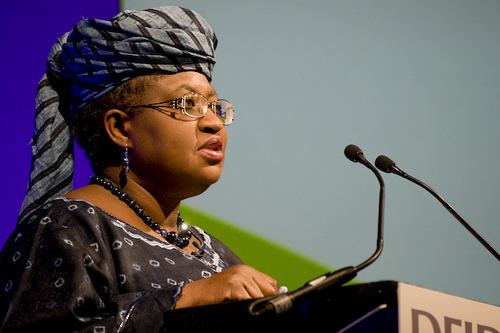The African Development Bank (AfDB) has said that it will part-pay some of the insurance premiums due to African nations who are being covered under the African Risk Capacity (ARC) insurance scheme.

AfDB president, Dr Akinwumi Adesina, made the disclosure on Tuesday 15 November, 2016 in Marrakech, Morocco during a side-event titled: “Africa at the forefront of climate change: Game changer through innovation” at the UN climate change talks (COP22) that held recently. The side-event was organised by the AfDB, ARC, African Group of Negotiators (AGN), and the African Ministerial Conference on the Environment (AMCEN).
Dr Adesina, who stressed that the AfDB would take the leadership in ensuring African member states are adequately covered through ARC insurance mechanism, called on its partners to ensure that the ARC succeeds by being fully funded.
“There’s no doubt that Africa is suffering from the impacts of climate change, therefore building resilience is critical. We have to now ensure that the ARC does not fail, we must make sure that it is fully funded. We will consider part payment of some of the insurance premiums to African countries. We also want others to pay their roles as well. Africa contributes to GHG emissions and also suffers disproportionately from it. The time for talk is over and the time for action is now,” he declared, even as he called on the Global Climate Fund as well as Global Environment Facility (GEF) to follow suit and in the part payment of insurance premium to needy nations.
An insurance premium is the amount of money that an individual or business must pay for an insurance policy.
Recently, the African Risk Capacity Insurance Company Limited (ARC Ltd) (the business arm of the ARC) announced it was processing an insurance payout of approximately $8.1 million to the Government of Malawi to support its response to the drought which resulted from the poor 2015/16 agricultural season.
The payout will be released to Malawi as soon as the Government’s plan on how the payout will be used to respond to those affected by drought – known as the Final Implementation Plan – is approved by ARC. This is standard practice for ARC payouts, and is expected to take place by the end of November.
In a response to Dr Adesina’s submission, the GEF Chairperson and CEO, Dr Naoko Ishii, said however that, rather than assist the ARC in paying premiums, GEF would rather prefer to create the capacity for knowledge and information exchange.
She underlined the need for cities to be made more resilient, in the face of growing threat of climate change and its impact. According to her, adequate funding is key.
Her words: “However, finance for sustainable urban infrastructure is hindered by many of the same barriers faced by sustainable infrastructure in general, including market failures, short-term thinking, and a lack of bankable projects and capacity at the urban level to prepare projects. Many cities around the world are constrained in their ability to tap local revenue sources, take on debt, invest in major projects and engage in public-private partnerships.”
Dr Ngozi Okonjo-Iweala, Chair, Board of ARC, who moderated the session, described the ARC as a specialised agency of the African Union (AU) which operates an extreme weather insurance scheme designed to help AU member states resist and recover from the ravages of drought.
“We’re here with one mechanism of the African continent, and what are the key priorities that we are articulating for Africa in COP22, and how does Africa Risk Capacity fit in?” she demanded, referring to the panellists comprising Dr Ishii, Rhoda Peace Tumusiime (AU Commissioner for Rural Economy & Agriculture), Prof Kevin Urama (AfDB Senior Advisor), the Assistant Environment Minister of Egypt, Ms. Yasmine Fouad.
Ms Tumusiime said: “The ARC is an important instrument for us. In 2015, Heads of States adopted the Agenda 2063; it is our blueprint and we are implementing the same. For us in Africa, the driving framework is Agenda 2063. Africa is experiencing a lot of challenges. Africa has made a lot of progress. In agriculture, we have seen an annual growth rate of 4%, but all these will be undermined by the challenge of climate change.
“We need something to hold on to, and in this case we have insurance. The AU Agenda 2063 is people centred. You can’t have growth without ensuring those aspects which are undermining growth are attended to. Climate change will not allow our growing economies to move forward; our growing economies will be undermined if we do not grow resilience in agriculture, for example.”
